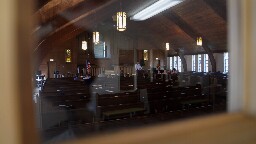America's nonreligious are a growing, diverse phenomenon. They really don't like organized religion



apnews.com
Mike Dulak grew up Catholic in Southern California, but by his teen years, he began skipping Mass and driving straight to the shore to play guitar, watch the waves and enjoy the beauty of the morning. “And it felt more spiritual than any time I set foot in a church,” he recalled.
Nothing has changed that view in the ensuing decades.
“Most religions are there to control people and get money from them,” said Dulak, now 76, of Rocheport, Missouri. He also cited sex abuse scandals in Catholic and Southern Baptist churches. “I can’t buy into that,” he said.
You are viewing a single comment
We are all born atheists. Religion is the oddity.
We are all born as social animals predisposed to superstition. Religion is practically inevitable.
Ok so, here's the funny thing, there might actually be a neural disorder to blame for the original polytheistic religions that morphed into modern religions.
There is the phenomenon that some people have an internal narration while others don't, but there's a hypothetical phenomenon within that phenomenon where someone has the internal narration, but doesn't recognize the narrator as their own voice, but rather as an outside presence instructing them on what to do next.
First time I heard of this my mind immediately went to the evangelicals who swear up and down that they have a personal communicative relationship with God.
I had the narrator when I was a kid and even asked other people if they could hear the person talking, which creeped out my siblings occasionally. Fortunately grew out of that by presumably realizing that was myself talking to me.
IIRC this is the idea behind avatar therapy for folks with vivid hallucinations
"Growing out of it" by slowly taking more and more control over how the hallucinations behave until they're basically just a sensory extension of the internal monologue
Ok, but followers of Judaism and Islam do not believe in a "personal relationship" with God. In those religions only the prophets got instructions directly from God, everyone else has to read their respective holy books.
I think the God of Spinoza view is a good one to convey to people that want to hold onto something. To say that the whole of existence is the nature of reality is redundant, but that is the answer. We exist because that’s the way things work, so the boundaries of the whole system don’t require a personal deity. The system in a sense is the deity and that waters it down to nothing supernatural. The one thing that I can still get behind is the possibility of simulation theory, which would totally fuck everything up. It is a theory though and not a steadfast belief.
Not really.
Magical thinking and rationalizing randomness are very innate features of humanity (and most animals, I.e. Skinner's box).
Overcoming this is both a noble and difficult pursuit, and it's arguably more worthwhile to recognize this than to incorrectly assume that we'd fall into rationality by default.
We wouldn't. We didn't. And that's exactly why religion exists in the first place and remains so successful.
We need to actively work hard to be better.
I agree with your sentiment. The takeaway for me is that we are influenced by our environment. Our experience is one of learning through experimenting with our reality, so it does come down to what we are presented with. I was raised around a temple that my parents were very active in, but it was reform, so I could ask lots of questions. I was told the narrative, but was allowed to interrogate it a bit and pretty much had the rabbi provide the evidence against religion by asking the right questions and getting fair responses. Others don’t get this opportunity and are instead force-fed religion and told not to question it. I still remember the moment that it clicked for me that it was all a charade. I basically asked the rabbi that, if all life is lived now per Judaism and we don’t have the concept of heaven or hell, then why do we need to do these practices and he basically said to make us feel happier. I was pretty much like ok, I’d rather go to space camp then.
Yeah, it's like the Aristotle quote saying "give me a child until he's seven and I'll show you the man." Not a lot of people have much chance to choose beliefs as opposed to have had them thrust on them.
As an aside, your rabbi's answer was essentially the outlook of the Sadducees in antiquity. They believed that there was no afterlife and that God didn't care what people did or didn't do, and yet followed the religious laws because they saw the law itself as a gift from God.
But I'm inclined to agree, that space camp sounds much better, and perhaps if the Sadducees had space camp too they'd have taken a different stance on things.